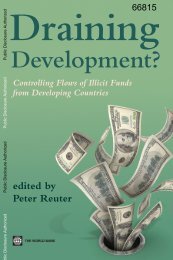rural-urban dynamics_report.pdf - Khazar University
rural-urban dynamics_report.pdf - Khazar University
rural-urban dynamics_report.pdf - Khazar University
Create successful ePaper yourself
Turn your PDF publications into a flip-book with our unique Google optimized e-Paper software.
GLOBAL MONITORING REPORT 2013 URBANIZATION AND THE MDGS 171<br />
city leaders consulted through the Platform<br />
asked the World Bank: What must be done to<br />
create jobs? What must be done to improve<br />
living conditions in slums and hazard-prone<br />
areas and to bridge the social divide? What<br />
must be done to expand the coverage and<br />
quality of basic services?<br />
So what has been learned to date? First,<br />
there are no straightforward answers to these<br />
questions, and the evidence base on many of<br />
these issues is filled with critical knowledge<br />
gaps. But the UKP’s discussions with hundreds<br />
of city leaders from around the world<br />
also taught that, while all cities are unique,<br />
the challenges they face are remarkably similar,<br />
even across stages of development—with<br />
shared issues ranging from climate change<br />
to social inclusion. That means that “know<br />
how” and solutions are transferable—that<br />
the lessons learned from one city can, and<br />
should, inform the choices of cities on the<br />
other side of the planet. In other words, while<br />
there is no single blueprint for success, it is<br />
the case that some countries and cities have<br />
been more successful than others. There is<br />
a need, therefore, for new and expanding cities<br />
of today to learn what worked and what<br />
did not from those that have gone before<br />
and to collaborate on common solutions to<br />
shared problems informed by the evidence.<br />
Such shared learning and collaboration has<br />
been obstructed by a lack of facilitating<br />
global public goods (such as forums, knowledge<br />
platforms, and open data). The World<br />
Bank through the UKP aims to help fill this<br />
gap and to play the role of knowledge broker.<br />
Second, most cities face not just a single<br />
bottleneck to sustainable development but<br />
a wide range of challenges that require integrated<br />
solutions and tight policy coordination<br />
across multiple agencies, jurisdictions, and<br />
disciplines that do not always have a natural<br />
incentive to collaborate. Most obviously,<br />
rapid <strong>urban</strong>ization has caused <strong>urban</strong> centers<br />
to spread beyond city boundaries and across<br />
disparate local governments that often fail<br />
to coordinate their actions, making it difficult<br />
to take a strategic approach to managing<br />
<strong>urban</strong> growth. A lack of sufficient policy<br />
coordination similarly hinders progress on<br />
several other aspects of <strong>urban</strong> development.<br />
For instance, UKP-led discussions and followon<br />
research by Professors Paul Collier and<br />
Tony Venables on the persistence of informal<br />
settlements demonstrate that no single root<br />
cause explains the failure to deliver affordable<br />
housing. Rather, a number of interrelated<br />
impediments need to be addressed<br />
through integrated action across disparate<br />
policy domains—from financing to housing<br />
regulations to the cost of construction materials—because<br />
isolated progress on any one<br />
bottleneck will be of limited impact if the others<br />
continue to bind. For <strong>urban</strong> knowledge<br />
generators and development practitioners to<br />
help, they must lead by example by leveraging<br />
platforms like the UKP to collaborate across<br />
disciplines and sectors to build integrated<br />
solutions to <strong>urban</strong> challenges.<br />
Third, the number one obstacle to providing<br />
city leaders with a fact-based understanding<br />
of their challenges and opportunities is<br />
the poor quality and tremendous fragmentation<br />
of city-level data. In fact, while many<br />
policy decisions are made and implemented<br />
at the local level, most statistical information<br />
is collected at the national level. As a result,<br />
more reliable data are available today on,<br />
say, the island-nation of Fiji—with a population<br />
of 860,000—than for the megacities<br />
of Delhi, Rio de Janeiro, or Shanghai, which<br />
each have populations in excess of 10 million.<br />
This imbalance creates an enormous mismatch<br />
between the scale at which information<br />
is available and the level at which <strong>urban</strong><br />
development is conducted, and significantly<br />
constrains the growth of cumulative <strong>urban</strong><br />
knowledge generation across countries,<br />
regions, and disciplines. To address this issue<br />
and respond to the overwhelming demand of<br />
its members and participants, the UKP has<br />
partnered with the Swiss government to, for<br />
the first time, systematically bring together<br />
and visualize data on cities for global benchmarking<br />
and evidence-based decision making.<br />
The goal is to work with cities and partners<br />
to harmonize, standardize, consolidate,<br />
and open-source city data to form a robust<br />
global evidence base on the challenges and<br />
opportunities faced by cities.<br />
The World Bank through the UKP is committed<br />
to facilitating this shared learning

















